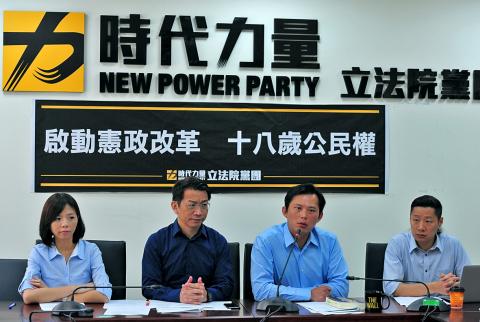The New Power Party (NPP) yesterday said it would propose constitutional amendments to remove the “one country, two areas” article from the Constitution, abolish the Taiwan Provincial Government and lower the minimum voting age from 20 to 18.
An amendment made to the Constitution in 1991 “to meet the requisites prior to national unification” recognizes the “Chinese mainland area” as opposed to the “free area,” and both areas make up the Republic of China.
“The constitutional identification of ‘one country, two areas’ is the biggest joke in the history of constitutional democracy, because the idea goes against the principle of popular sovereignty, which states that the authority of a nation is created and sustained by its citizens,” NPP Executive Chairman Huang Kuo-chang (黃國昌) said.

Photo: Wang Yi-sung, Taipei Times
“Taiwan is a sovereign nation with a population of 23 million people and there is no ‘Chinese mainland area’ in this nation,” he added.
Surveys have shown that more than 70 percent of Taiwanese believe that the “cross-strait relationship” is international in nature, and abolishing the “one country, two areas” article is key to normalizing Taiwan’s status and dealing with the notorious legacy of the now-defunct National Assembly, Huang said.
Abolishing the Act Governing Relations between the People of the Taiwan Area and the Mainland Area (臺灣地區與大陸地區人民關係條例) is a further step that needs to be taken toward the normalization of the nation, he added.
Lowering the voting age is a global trend to encourage young people to exercise their political rights, but the Chinese Nationalist Party’s (KMT) unreasonable boycott of a proposal to lower the voting age last year obstructed a potential youth empowerment and constitutional amendment, Huang said.
“There are 890,000 people aged between 14 and 16, and they can cast their first ballot in the next presidential and legislative elections in 2020 if the amendment can be put to a referendum and approved in the next nine-in-one elections in 2018,” he said.
The constitutional changes in 1998 stripped the Taiwan Provincial Government of its authority, essentially making it a nominal institution, but it still costs the nation millions of New Taiwan dollars every year, the NPP said.
Asked whether the proposed amendments would be associated with Taiwanese independence and upset China, Huang said domestic reform has to be undertaken independent of other nations’ opinions, even though attaining international recognition is an important step toward the normalization of Taiwan.
NPP Legislator Freddy Lim (林昶佐) said no politician, regardless of their affinity, would be willing to sacrifice Taiwan’s democracy, liberty and human rights, and no one would accept China’s interference in Taiwan’s constitutional reform.

CHAOS: Iranians took to the streets playing celebratory music after reports of Khamenei’s death on Saturday, while mourners also gathered in Tehran yesterday Iranian Supreme Leader Ayatollah Ali Khamenei was killed in a major attack on Iran launched by Israel and the US, throwing the future of the Islamic republic into doubt and raising the risk of regional instability. Iranian state television and the state-run IRNA news agency announced the 86-year-old’s death early yesterday. US President Donald Trump said it gave Iranians their “greatest chance” to “take back” their country. The announcements came after a joint US and Israeli aerial bombardment that targeted Iranian military and governmental sites. Trump said the “heavy and pinpoint bombing” would continue through the week or as long

TRUST: The KMT said it respected the US’ timing and considerations, and hoped it would continue to honor its commitments to helping Taiwan bolster its defenses and deterrence US President Donald Trump is delaying a multibillion-dollar arms sale to Taiwan to ensure his visit to Beijing is successful, a New York Times report said. The weapons sales package has stalled in the US Department of State, the report said, citing US officials it did not identify. The White House has told agencies not to push forward ahead of Trump’s meeting with Chinese President Xi Jinping (習近平), it said. The two last month held a phone call to discuss trade and geopolitical flashpoints ahead of the summit. Xi raised the Taiwan issue and urged the US to handle arms sales to

State-run CPC Corp, Taiwan (CPC, 台灣中油) yesterday said that it had confirmed on Saturday night with its liquefied natural gas (LNG) and crude oil suppliers that shipments are proceeding as scheduled and that domestic supplies remain unaffected. The CPC yesterday announced the gasoline and diesel prices will rise by NT$0.2 and NT$0.4 per liter, respectively, starting Monday, citing Middle East tensions and blizzards in the eastern United States. CPC also iterated it has been reducing the proportion of crude oil imports from the Middle East and diversifying its supply sources in the past few years in response to geopolitical risks, expanding

Pro-democracy media tycoon Jimmy Lai’s (黎智英) fraud conviction and prison sentence were yesterday overturned by a Hong Kong court, in a surprise legal decision that comes soon after Lai was jailed for 20 years on a separate national security charge. Judges Jeremy Poon (潘兆初), Anthea Pang (彭寶琴) and Derek Pang (彭偉昌) said in the judgement that they allowed the appeal from Lai, and another defendant in the case, to proceed, as a lower court judge had “erred.” “The Court of Appeal gave them leave to appeal against their conviction, allowed their appeals, quashed the convictions and set aside the sentences,” the judges